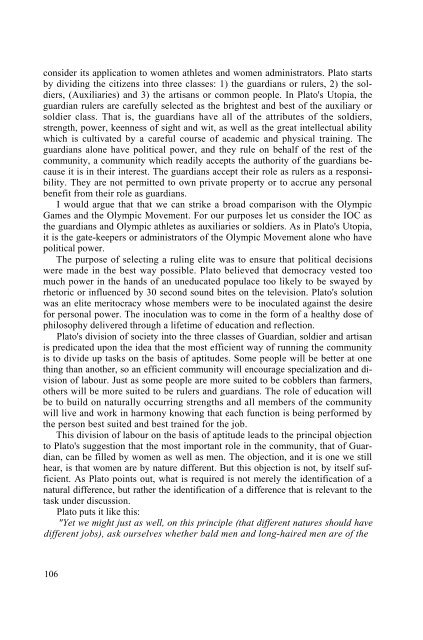Create successful ePaper yourself
Turn your PDF publications into a flip-book with our unique Google optimized e-Paper software.
consider its application to women athletes and women administrators. Plato starts<br />
by dividing the citizens into three classes: 1) the guardians or rulers, 2) the soldiers,<br />
(Auxiliaries) and 3) the artisans or common people. In Plato's Utopia, the<br />
guardian rulers are carefully selected as the brightest and best of the auxiliary or<br />
soldier class. That is, the guardians have all of the attributes of the soldiers,<br />
strength, power, keenness of sight and wit, as well as the great intellectual ability<br />
which is cultivated by a careful course of academic and physical training. The<br />
guardians alone have political power, and they rule on behalf of the rest of the<br />
community, a community which readily accepts the authority of the guardians because<br />
it is in their interest. The guardians accept their role as rulers as a responsibility.<br />
They are not permitted to own private property or to accrue any personal<br />
benefit from their role as guardians.<br />
I would argue that that we can strike a broad comparison with the Olympic<br />
Games and the Olympic Movement. For our purposes let us consider the IOC as<br />
the guardians and Olympic athletes as auxiliaries or soldiers. As in Plato's Utopia,<br />
it is the gate-keepers or administrators of the Olympic Movement alone who have<br />
political power.<br />
The purpose of selecting a ruling elite was to ensure that political decisions<br />
were made in the best way possible. Plato believed that democracy vested too<br />
much power in the hands of an uneducated populace too likely to be swayed by<br />
rhetoric or influenced by 30 second sound bites on the television. Plato's solution<br />
was an elite meritocracy whose members were to be inoculated against the desire<br />
for personal power. The inoculation was to come in the form of a healthy dose of<br />
philosophy delivered through a lifetime of education and reflection.<br />
Plato's division of society into the three classes of Guardian, soldier and artisan<br />
is predicated upon the idea that the most efficient way of running the community<br />
is to divide up tasks on the basis of aptitudes. Some people will be better at one<br />
thing than another, so an efficient community will encourage specialization and division<br />
of labour. Just as some people are more suited to be cobblers than farmers,<br />
others will be more suited to be rulers and guardians. The role of education will<br />
be to build on naturally occurring strengths and all members of the community<br />
will live and work in harmony knowing that each function is being performed by<br />
the person best suited and best trained for the job.<br />
This division of labour on the basis of aptitude leads to the principal objection<br />
to Plato's suggestion that the most important role in the community, that of Guardian,<br />
can be filled by women as well as men. The objection, and it is one we still<br />
hear, is that women are by nature different. But this objection is not, by itself sufficient.<br />
As Plato points out, what is required is not merely the identification of a<br />
natural difference, but rather the identification of a difference that is relevant to the<br />
task under discussion.<br />
Plato puts it like this:<br />
"Yet we might just as well, on this principle (that different natures should have<br />
different jobs), ask ourselves whether bald men and long-haired men are of the<br />
106

















